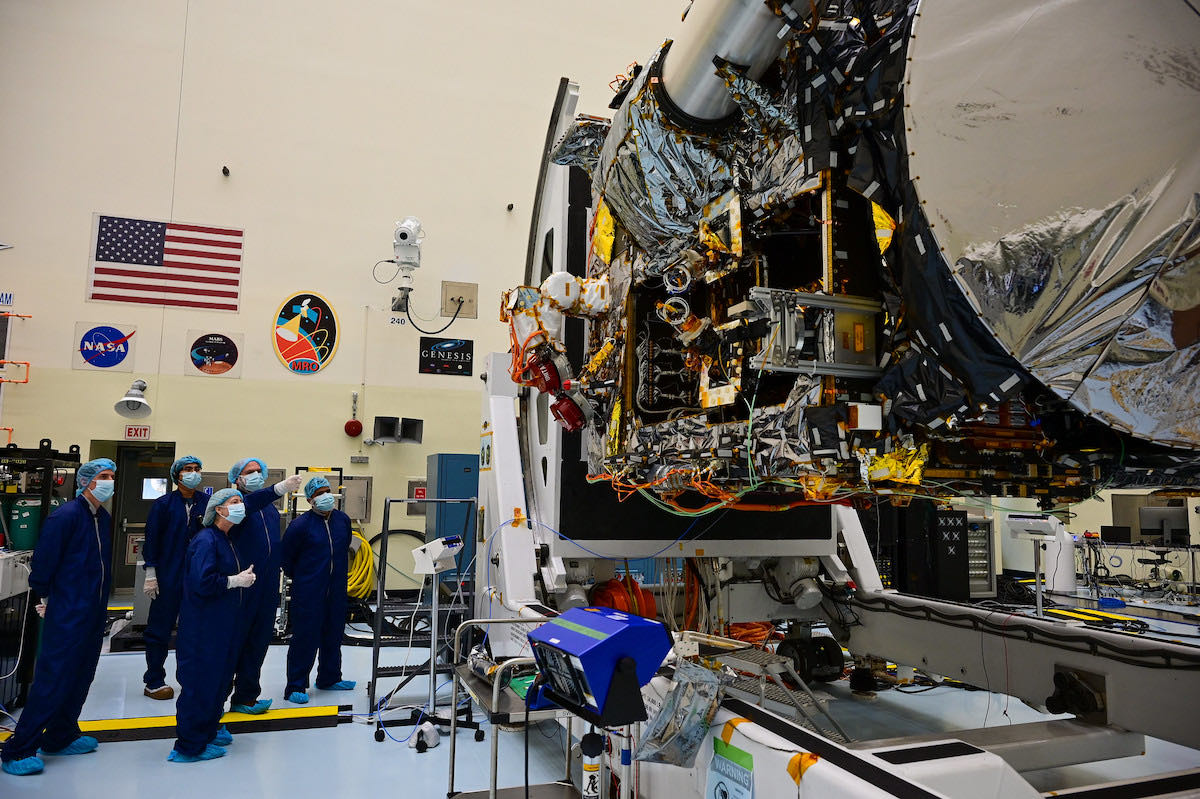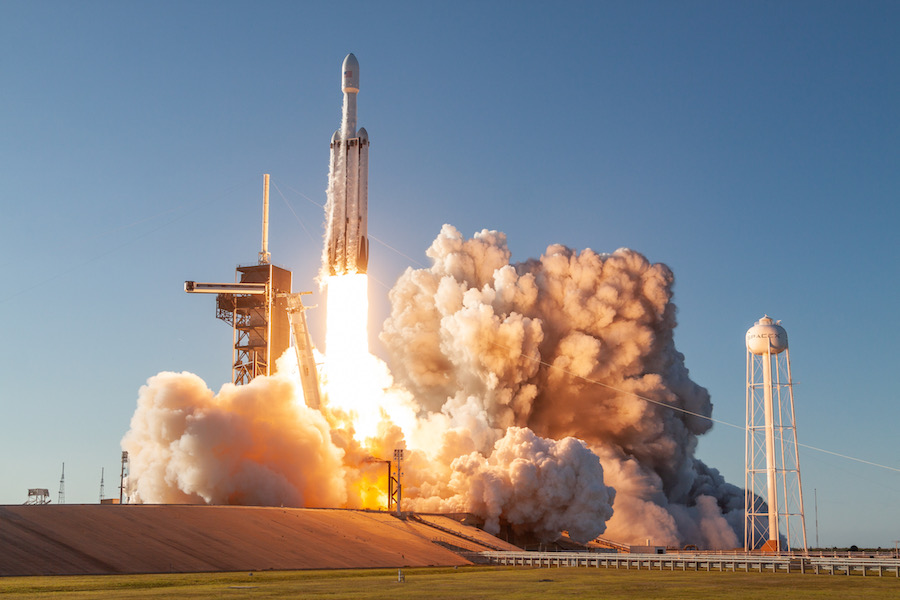
The launch of NASA’s Psyche asteroid mission, which was set for Aug. 1 on a SpaceX Falcon Heavy rocket, has been delayed to no earlier than Sept. 20 after ground teams discovered an issue during software testing on the spacecraft, officials said Monday.
The robotic asteroid explorer arrived at NASA’s Kennedy Space Center in Florida from the Jet Propulsion Laboratory in California on April 29 aboard a U.S. military cargo plane. Then ground teams moved the spacecraft, packed inside a climate-controlled shipping container, to a clean room at the Payload Hazardous Servicing Facility.
Technicians unboxed the Psyche spacecraft and moved it to a handling fixture for a series of hardware and software tests to make sure the probe survived the cross-country trip from California.
But a technical issue interrupted the test campaign, and will delay the launch of the Psyche mission at least seven weeks.
“An issue is preventing confirmation that the software controlling the spacecraft is functioning as planned,” NASA said in a written statement, responding to questions from Spaceflight Now. “The team is working to identify and correct the issue.”
The new launch readiness date for Psyche is no earlier than Sept. 20, according to Gretchen McCartney, a spokesperson at JPL, the NASA center leading the Psyche mission.
The mission has a launch period extending from Aug. 1 into the fall, when Earth is in the proper position in the solar system to make Psyche’s interplanetary journey feasible. The spacecraft is headed for the asteroid Psyche — the spacecraft’s namesake — a metal-rich world in the asteroid belt between the orbits of Mars and Jupiter.
NASA and members of the Psyche team did not respond to a question on the exact length of the mission’s interplanetary launch period this year, or when the mission’s next launch period would open after 2022.
Other work required to prepare the Psyche spacecraft for launch included the installation of its deep space transponder, part of the probe’s communications system, after it had to be removed from the spacecraft at JPL for troubleshooting. Ground crews also plan to load more than a ton of xenon gas into the spacecraft’s all-electric propulsion system, then encapsulate Psyche inside the nose cone of its launch vehicle.
A Falcon Heavy rocket provided by SpaceX will blast off from pad 39A at Kennedy and hurl the Psyche spacecraft on an escape trajectory away from Earth, allowing the probe to reach Mars in May 2023 for a flyby maneuver, using the planet’s gravity to slingshot toward its asteroid destination.
The Psyche spacecraft will reach the asteroid Psyche in January 2026, then enter a series of orbits at different distances to map the unexplored world. Psyche, the asteroid, has an irregular shape, an average diameter of about 140 miles (226 kilometers), and is made mostly of nickel and iron metals.
Psyche was assembled and tested at JPL. Maxar Technologies, a builder of commercial communications satellites, provided the spacecraft’s chassis, propulsion system, and solar panels. JPL, with extensive experience in deep space operations, provided Psyche’s flight computer, software, and parts of the communications and power systems.
The three-and-a-half year trip to asteroid Psyche will span 1.5 billion miles (2.4 billion kilometers). The spacecraft is designed to spend at least 21 months studying the asteroid after arrival in 2026.
NASA selected Psyche as a Discovery-class, cost-capped interplanetary mission in 2017, alongside the Lucy asteroid explorer, which launched last year. The Psyche mission’s total cost is nearly $1 billion, including development, launch services, and operations.
Two small spacecraft will hitch a ride to space with Psyche. NASA’s twin Janus probes, each weighing just 80 pounds (36 kilograms), will launch on the same Falcon Heavy rocket as Psyche, but will head off into the solar system to fly by separate asteroids.

The Psyche mission will mark NASA’s first use of SpaceX’s Falcon Heavy rocket, a heavy-lifter created by connecting three SpaceX Falcon 9 rocket boosters together. The design gives the Falcon Heavy rocket 5.1 million pounds of ground-shaking thrust at liftoff, generated by 27 Merlin main engines.
SpaceX launched the first three Falcon Heavy missions in 2018 and 2019, but more than three years will have passed between the third and fourth Falcon Heavy rocket flights.
Several Falcon Heavy launches are potentially scheduled before the end of the year, including NASA’s Psyche mission and the commercial ViaSat 3 Americas broadband internet satellite, also slated to launch no earlier than the September timeframe.
The U.S. Space Force has two Falcon Heavy missions that could launch late this year with secret military satellites. One of those missions, USSF 44, had been tentatively scheduled for late June, but has been postponed indefinitely. A Space Force spokesperson said last week he could not provide an updated schedule for the USSF 44 mission.
Another Space Force launch, designated USSF 52, is also assigned to a Falcon Heavy launch. It was originally scheduled to fly after USSF 44 in the October timeframe, but that was before the latest delay in the USSF 44 mission.
All of the delays to the upcoming Falcon Heavy missions have been caused by payload issues.
The Space Force’s USSF 44 mission was supposed to launch in late 2020, and the Space Force has attributed the schedule slips to spacecraft delays.
Viasat’s next-generation broadband satellite, set to beam internet connectivity to the Americas, has faced manufacturing, workforce, and supplier problems the company has partly blamed on the COVID-19 pandemic. NASA’s Psyche asteroid mission is the latest Falcon Heavy payload to run into a launch delay.
Email the author.
Follow Stephen Clark on Twitter: @StephenClark1.
from Spaceflight Now https://ift.tt/6IKtxpu
via World Space Info







0 comments:
Post a Comment